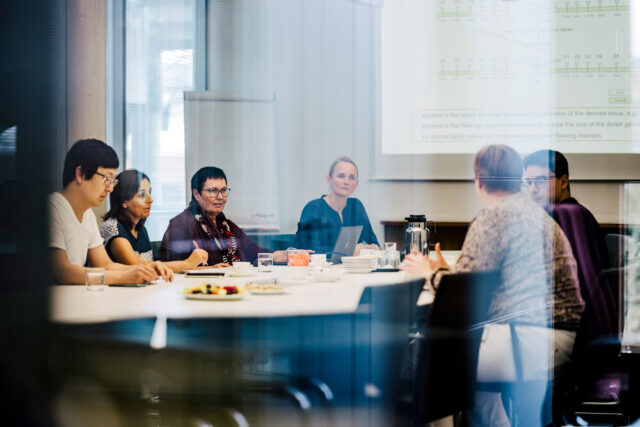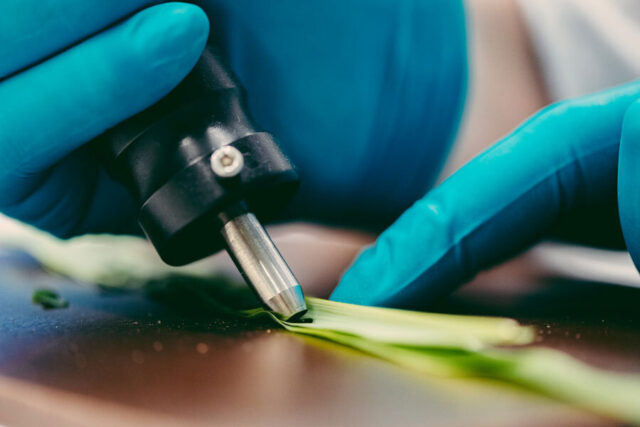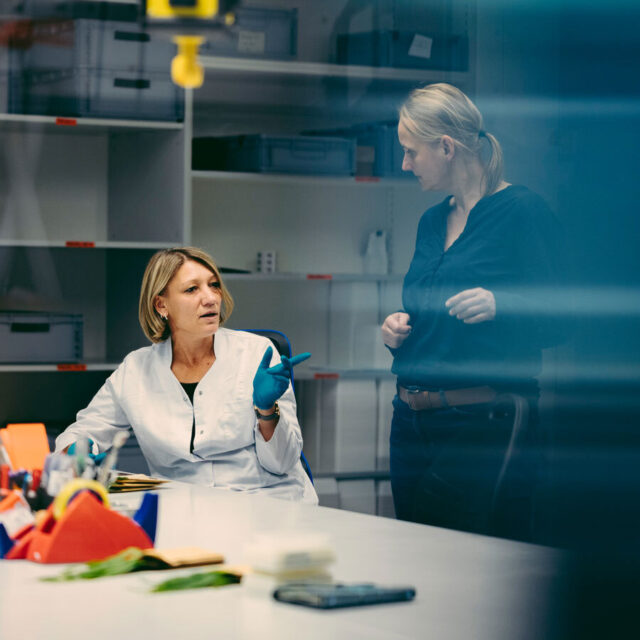Milena Ouzunova
Knowledge
across generations
When Milena Ouzunova joined KWS, some of today’s common breeding technologies were still in their infancy. Retiring after 28 years, she names pioneering developments and emphasizes the importance of teamwork, including for knowledge transfer.
Milena Ouzunova was head of applied breeding technologies for corn and oilseeds for almost three decades. She has worked together with her successor Silke Wieckhorst for 14 years.
Milena Ouzunova could brag. She could single out the milestones in applied breeding technologies for corn and oilseeds as achievements in her own career – after all, she has been in charge of the unit at KWS for 15 years and has been with the company for almost twice as long. One such milestone was molecular markers, which speed up breeding. Or genomic selection, a game changer in the application of molecular markers in plant breeding. Since the beginning of the 2010s, it has enabled breeders to make even more precise and earlier predictions about which plants are suitable for variety development, with the result that many field trials can be eliminated thanks to pre-selection. And then there was the world’s first use of doubled haploid technology in corn. Sure, Milena names these accomplishments. But she doesn’t give herself the credit, but instead sees the milestones as a team success.
When she came to KWS on January 1, 1997, this diverse team of now 65 colleagues from 15 nationalities did not exist. Milena joined the company back then to build its capabilities in the field of applied breeding technologies for corn. Her position was called Project Manager Molecular Markers. “This technology was still something very new. It was exciting for me to persuade and win over the breeders.”
Video
▶ Teamwork
Milena Ouzunova cites not only research results as highlights from 28 years at KWS, but also working in the team.

Teamwork also in the transition: Milena and Silke together in a meeting
From an innovation to a service
She knew about the technology’s advantages from her university studies. The scientist with a Master of Science in Chemistry gained her doctorate in plant breeding from the University of Göttingen. She earned that title as part of a large collaborative project on the quality of oilseed rape, in which KWS was a participating company. After initially continuing her research at the university, she was offered the new job in Einbeck. “The decision wasn’t an easy one. At the end of the day, the deciding factor was that I was keen to follow through with what I was doing and see the benefits of a technology. I’m still doing research, but applied industrial research.”
She regards her department as a driver of innovation throughout the entire breeding process. She researches new technologies with an eye to their potential for breeding. “It’s important for us to have the freedom to try things out, make mistakes now and again and scrap ideas.” The team passes on good ideas right after they have been successfully implemented: “Breeding is responsible for product development, i.e. for high-yielding, high-quality varieties. We and our breeding technologies help to speed up this process. As soon as the innovations are ready to use, we become service providers by applying these technologies in the breeding process.”
As new insights were discovered and the number of breeding programs increased, the team continued to grow. “When I started, there were six programs for corn and one for oilseed rape. Now we have more than 25 for corn, one for sorghum and two for oilseed rape.” In 2009, KWS also decided to relaunch the sunflower breeding program. “It was immediately clear that we needed molecular markers to accelerate the program from its very outset.”

Milena numbers high-throughput marker technologies as one of the highlights of her career.

Expert: Breeding technologies for sunflowers brought Silke Wieckhorst (right) to KWS.
New colleague and now her successor
KWS created a new position for that – and this is when Silke Wieckhorst came into the picture. She grew up on a farm, trained as a technical assistant in plant breeding and, after studying agricultural biology, was a doctoral student at the Technical University of Munich at the time. Silke heard about the prospective new career from a current KWS colleague and was very interested – because she was working on breeding technologies for sunflowers.
“Silke was extremely motivated to forge ahead in this field and apply new technologies from corn to her specialist area,” says Milena. She saw that Silke had what it took to be her successor early on: “It’s extremely important to identify and develop potential managers at an early stage.” Be it through further training or by delegating responsibility. “Ultimately, it’s all about learning by doing.”
Indeed, Silke took on her first management responsibility in 2014, just four years after being hired. Another five years on, Silke was heading her first working group with several scientists, which dealt with breeding technologies for sunflower and sorghum, as well as research into inducer and trait integration. And now, another five years later, she took over the reins from Milena in October. One group will become seven, which she will lead from now on and whose work will include marker applications, quantitative genetics, breeding informatics, native traits and genome research. The handover was initiated at the start of the new fiscal year and lasted several weeks. “Milena was a great help,” recalls Silke.
“I’m proud of the milestones and my team.”
Milena Ouzunova
The importance of team spirit
Of course, just a few weeks was not long enough for Milena to pass on her knowledge from 28 years of industrial research and as an honorary professor at the Technical University of Munich since 2020. But she doesn’t have to, either. “It’s a continuous process. Silke and I have worked together for 14 years now. Thanks to the spirit of collegiality and open communication between us, we’ve always learned from each other – as I’ve done from breeders, other old and new colleagues or in partnerships with universities, thanks to which we’re on the verge of achieving new developments.”
And so Milena left the company in October with mixed emotions, but convinced of the team’s expertise. She’s now looking forward to spending time with family and friends in Germany and her native Bulgaria. Yet: “Once a researcher, always a researcher. I’ll keep on doing some things on a small scale.” Her teaching at the Technical University of Munich is one of them, and she will also continue working for KWS on specific projects and meet her colleagues again from time to time. Of course, she does not omit to mention them when summing up her career: “Looking back, I’m proud of the milestones – but most of all of my team.” |
This article is from insideKWS, the employee magazine of KWS. If you are an employee of our company, you have access to all other articles and previous issues. |
Dieser Artikel stammt aus der KWSintern, dem Mitarbeitermagazin der KWS. Wenn Sie Mitarbeiterin oder Mitarbeiter unseres Unternehmens sind, haben Sie Zugriff auf alle weiteren Artikel und auf frühere Ausgaben. |
© KWS SAAT SE & Co. KGaA 2024